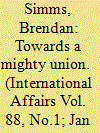|
|
|
Sort Order |
|
|
|
Items / Page
|
|
|
|
|
|
|
| Srl | Item |
| 1 |
ID:
115079


|
|
|
|
|
| Publication |
2012.
|
| Summary/Abstract |
Lazy, profligate, scheming Greeks versus honest, thrifty, industrious Germans. Southern vice versus northern virtue.
For much of the news media-not only in continental Europe's "virtuous" north, but also in the United States-the euro sovereign debt crisis could be summarized in the form of this morality play opposing national or regional stereotypes. If in Germany itself it was the deliberately over-the-top tabloid Bild that famously took the lead in lecturing the Greeks on Greek vice and German virtue, in the United States, New York Times columnist Thomas Friedman adopted essentially the same tone and underlying "analysis." "Can Greeks Become Germans?" Friedman asked in a column written last year, suggesting that this was the only way the crisis could be resolved. Even the acronym commonly employed for southern Europe's fiscal "sinners" reflects moral opprobrium and contempt: the "PIGS" (sometimes written "PIIGS," so as to include also the northern European special case, Ireland, along with Portugal, Italy, Greece, and Spain).
|
|
|
|
|
|
|
|
|
|
|
|
|
|
|
|
| 2 |
ID:
111689


|
|
|
|
|
| Publication |
2012.
|
| Summary/Abstract |
A strong European Union is needed today more than ever: to act as a reliable partner to the United States, Great Britain and the other great democracies; to deal with the growing threats on her southern and eastern periphery; and most pressingly of all, to deal with the euro sovereign debt crisis. In order to do so, Europeans will have to abandon the gradualist fallacy that union will be achieved in small incremental steps and learn the lesson of history that all successful mergers, such as the British and the American, have been carried out in one fell swoop at a time of extreme crisis. They will have to recognize that the road to unity took a fatal turn when the failure of the European Defence Community caused a bifurcation between politico-military and economic integration. Today, as we face potential fiscal and economic meltdown and as the external threats to Europe mount, we have another opportunity. We can only seize it, however, if we realize that full European union, if there is to be one, will be an event, not a process. It must follow more or less the American example with a directly elected presidency, a house of representatives elected by population and a senate, which represents the former nation-states and regions. There is no need for the United Kingdom to be part of this project, but it is essential that both unions work together for the common good. Because the existing political elites are incapable of rising to the occasion-and in many cases are actually antipathetic to it-the task must fall to a new pan-European party: the Party of Democratic Union.
|
|
|
|
|
|
|
|
|
|
|
|
|
|
|
|
|
|
|
|
|